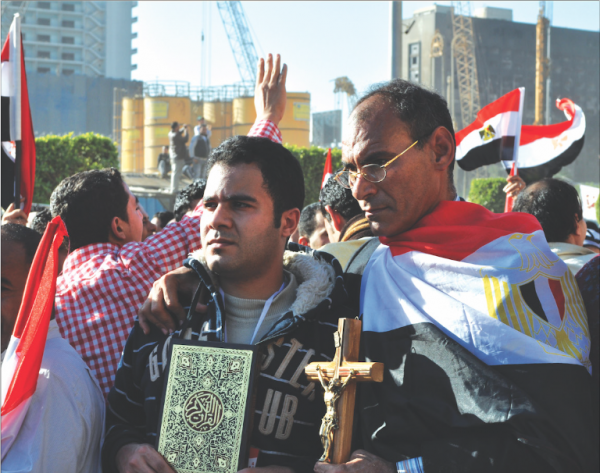
@Yasmine_Nabil
Increased terrorist threats and attacks against the Coptic community in El Arish have displaced hundreds of families fleeing from North Sinai to Ismailia and Port Said.
Seven Copts, including a veterinarian, were killed during the last two weeks of February, while other members in the community received death threats.
Last week, the Islamic State in Iraq and the Levant (also known as ISIL, or ISIS) released a video in which it described Copts as “infidels” and threatened to wipe them out.
“At first, when families started fleeing, they were housed immediately in coordination with and the funding of the Kasr El Dobara Evangelical Church,” Ezzat Afifi, pastor of the Evangelical Ismailia Convoy Church told The Caravan.
Afifi further explained that with the number of fleeing families increasing dramatically, the government intervened and took on the responsibility of relocating them.
The role of the church was limited to coordinating between the government and the families as well as making sure all their needs are met in their new houses.
“Almost 120 Coptic families came to us. We are planning on sending them back to their original homes in El Arish but that is only after we have made sure that it is safe there again,” Afifi said.
Fleeing families cannot leave El Arish forever, he added.
“That would mean that terrorism was actually successful there,” he said.
He also praised all the efforts by the army and police to counter terrorism.
“Working on the security solution alone is not sufficient. We should also work on fixing the community itself. We are still only reacting to problems after they have happened instead of avoiding them from early on,” Afifi said.
The Sinai attack is not the first of its kind to target minorities.
An explosion claimed by ISIS in the Saint Mark Cathedral in Abbassiya in December killed 25 people and injured more than 30.
In May 2016, clashes between Christians and Muslims broke out in El Karam village in Minya over rumors of an affair between a Christian man and a Muslim woman in the village.
These attacks resulted in the burning down of some of the houses belonging to Copts.
An old Christian woman was stripped naked of her clothes and paraded through the streets by a mob of extremist Muslims.
In another major violent attack, a bomb in Elkedeseen Church in Alexandria killed more than 24 Coptic Christians and left hundreds injured on December 31, 2011.
This incident sparked country-wide public outrage. The attackers have still not been identified.
Ashraf El-Sherif, adjunct faculty in the Department of Political Science, said that discrimination against Christians in Egypt is systematic, and comes in three forms.
“The first type is ideological discrimination practiced by extremist Islamist groups such as the latest attacks in Sinai. The second is non-ideological and unorganized discrimination practiced by ordinary citizens such as the several violence cases against Copts in Upper Egypt,” El-Sherif said.
“Finally, the third type is discrimination practiced by the state itself in terms of positions, privileges, opportunities, treatment, rights such as building houses of worship and failure to protect the Copts from the popular sectarian discrimination.”
He also added that the state must eradicate the environment that encourages terrorism and change public policies with regards to the rights of the Copts in Egypt.
“There is no decisive solution to discrimination against Copts other than creating a democratic framework that includes values such as pluralism, equality, respect for others, rule of law and even the renewal of religious discourse and the independence of religious institutions, such as Al-Azhar, endowments and Ifta, from the state,” El-Sherif said.
Earlier this month, the Egyptian Coptic Orthodox Church condemned the El Arish events in a statement, which said the incident aimed to undermine national unity and weaken counter-terrorism efforts.
In his meeting at the second session of the Prsidential Leadership Program for youth, President AbdelFattah El-Sisi said that the state is keen to provide all help and assistance to the people of El Arish.
He also stressed the importance of maintaining national unity and confidence in the state.
But Christians of different denominations in the Middle East have been leaving in increasing numbers.
ISIL has targeted Christians in Iraq and Syria, leading to a refugee exodus.
“Many Copts leave Egypt because of ill-treatment. It is a fact that cannot be denied that there is religious discrimination in Egypt,” Jean Paul, 32, an Egyptian Coptic migrant living in Amsterdam, told The Caravan.
“If we ever want to deal with that problem, we first have to admit it is there,” he added.
The ‘Egyptians for One Homeland Foundation’ has repeatedly called for demonstrations to show solidarity with displaced families in El Arish.
Chairman of the Board of Trustees of the Foundation Mohammed Megahed told The Caravan that his organization is hoping to pressure the House of Representatives into taking immediate action and providing families in El Arish with adequate security and safety.
